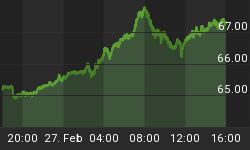As a steady stream of bad U.S. economic news accumulates, one wonders when the stock market will finally take notice. After years of highly effective spin coming from Washington and Wall Street, stock investors must re-learn how to recognize bad news, and to stop making lemonade out of every economic lemon that comes their way.
Little noticed amidst the dizzying stock rally in May was the steep increase in bond yields. Costlier credit has ominous implications for highly indebted American families (particularly homeowners with ARMs), over-leveraged corporations, hedge funds and private equity players, and the biggest debtor of them all, the Federal government itself, which must constantly refinance trillions of dollars of maturing debt.
In addition to rising interest rates, more sobering housing market news arrived last week, including record declines in new home prices and existing home sales. Combine this with steeper losses and more warnings from prominent home builders such as Toll Brothers and Hovnanian, and the housing picture gets a lot bleaker. Not only does Wall Street fail to grasp how the chill in real estate will dampen consumer spending, but it is also in denial about how much further home prices and consumer spending will fall as interest rates continue to rise.
Yesterday we learned that 1st quarter GDP "grew" at an annualized rate of only .6% (of course if the government used honest inflation numbers, real GDP is already contracting). Slower growth means fewer jobs and declining incomes, which will further pressure the housing market as homeowners have less income to confront rising adjustable rate mortgages. For potential home buyers the situation is even worse. Not only do they face higher mortgage payments but they must now come up with actual down-payments (which they do not have) and meet far stricter lending standards, including documenting their inadequate incomes.
Today we received further evidence that our imbalanced economy is moving further off kilter as another 19,000 manufacturing jobs were lost and the personal savings rate fell to minus 1.3%. Fewer goods being produced means even larger future trade deficits, which will be made more difficult to finance as a result of rising interest rates. Tighter credit and inadequate income growth will also make record personal indebtedness that much more costly to service.
My guess is that Wall Street's blissful slumber may be ended by the shrilling wake-up call of the collapsing dollar. In the last ten weeks the Canadian dollar has risen by over 10% against the greenback. That's about one percent per week - incredible! With the weakness in the U.S. economy becoming increasingly apparent overseas, and global interest rates continuing their ascent, it will not be much longer before foreigners pull the plug on the dollar. When they do, it's the American economy, and Wall Street's phony rally, that will go down the drain.
For a more in depth analysis of the tenuous position of the Americana economy and U.S. dollar denominated investments, read my new book "Crash Proof: How to Profit from the Coming Economic Collapse." Click here to order a copy today.
More importantly make sure to protect your wealth and preserve your purchasing power before it's too late. Discover the best way to buy gold at www.goldyoucanfold.com, download my free research report on the powerful case for investing in foreign equities available at www.researchreportone.com, and subscribe to my free, on-line investment newsletter at http://www.europac.net/newsletter/newsletter.asp.















